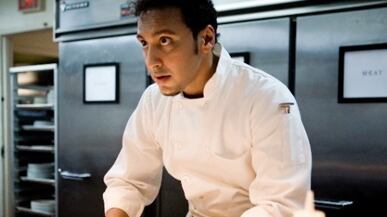Aasif Mandvi is at a delicious point in his life. The Daily Show correspondent who is often referred to as the “Middle Eastern” correspondent (though he is not from the Middle East) dances a fine line between his notoriety among South Asians and Western audiences. Those familiar with Mandvi’s long acting career may have seen him in smaller films like American Chai, or in his one-man off-Broadway play Sakina’s Restaurant. The Bombay Muslim is a rising star who has been acting since he first came to America in 1991, after his family moved to Tampa from England.
In Today’s Special, which opened last week, Mandvi plays the embittered chef Samir at a chic Manhattan restaurant. Mandvi wrote the film with former Daily Show writer Jonathan Bines. He describes it as a “tandoori comedy”—a culmination of Indian flavors with American comedy.
The Daily Beast: How much of you is in this movie?
Mandvi: You know what? I see a lot of myself in this movie—from the whole immigrant experience in my own family and all that stuff.
TDB: Are you a foodie?
AM: As far as me being a foodie... If a foodie means that I love to eat food, then yes, I am a foodie. But when we wrote the script, my co-writer, Jonathan Bines—he was actually a food critic as well as a comedy writer. And his knowledge of food was what kind of drove both of us in terms of exploring the whole world of Indian cuisine. And I cook! But I have to have my mother on the other end of the phone.
TDB: You cook?
AM: Yeah! I have cooked Indian feasts before, but I need like my mom on the other end of the line because the first time I did it, I screwed up rice?! So then I thought to myself, Oh god, I’m never going to do this again. So then I asked my mom, I was like, “OK, help me, walk me through this!” and she would be like [in a motherly Indian accent], “OK, just add a little bit of that, a little bit of this, put your finger in the water until it comes to the one index and you’ll just know it’s right.”
TDB: That’s hilarious!
AM: Oh, but it’s really kind of great you know? ‘Cause it does give you a real connection to the food as opposed to just following a recipe ‘cause what you see described is not like a recipe book at all.
TDB: In the film, there is a connection between the immigrant experience and the food experience.
AM: Listen, food is a real metaphor in films—all the time it’s used as a metaphor. And in this movie the food is a metaphor of Samir’s journey. Samir thinks of being a great chef and then he ends up stuck in this Indian restaurant where he has to learn about Indian cooking. There is a sort of alchemy of the masala in some ways, and that journey is parallel to the emotional journey he takes.

TDB: What did you learn about Indian food?
AM: When we started doing research about Indian food, we found that so much of it is about the inspiration. So much of Indian cooking is like jazz. It’s not just really all about the structures and the moves and the recipes. So that became essentially the hook of the film.
TDB: You call this movie a “tandoori comedy.” What does that mean?
AM: I’ve coined that term! A tandoori comedy, yes. It’s about Indian food, it’s funny, it’s about family, it's heartfelt and uplifting, and it’s a movie with a lot of Indian food in it.
TBD: You’re dabbling in a lot right now—writing, Daily Show, films. Is there something you prefer, or do you enjoy putting on a lot of hats?
AM: I think that I cannot do one thing for too long. I have to sort of move on, and I really enjoy the multiplicity of it all. And I’ve been fortunate enough to have the opportunity to do that. I hope I continue writing things.
TDB: Samir is Muslim in this film, and it seems like this movie has come out during a time where we have a media storm about Islam in the media. How is Samir’s faith addressed in the movie, if at all?
AM: Well you know what’s interesting about this? The fact that this family is Muslim is not addressed in any way in the film, except that it’s a fact of their life. There’s always this, “Oh they are Muslim, so they are going to have to deal with some kind of political thing,” and the fact is, that is not the Islam that I know. It’s not the Islam that I grew up with. I mean it’s not like I timed it out. We wrote this film’s first draft before 9/11 so there was never any thought of that. For me, it was just always about the authenticity of the family that just happens to be Muslim and it’s just the reality of their life.
There is a scene where the father and the son just pray namaz together. For me, that scene is one of the most important scenes in the film. Just the simple pure fact of a father and son, bonding over the act of praying namaz together and to have an American audience sit there and watch that, and experience it from the emotional place where they care about each other, that was just something that I wanted to impart, I guess, to the American public.
Plus: Check out Hungry Beast, for more news on the latest restaurants, hot chefs, and tasty recipes.
Shefali Kulkarni is an Editorial Assistant at The Daily Beast. She has written for the Village Voice, Willamette Week and recently graduated from Columbia University's Graduate School of Journalism.





